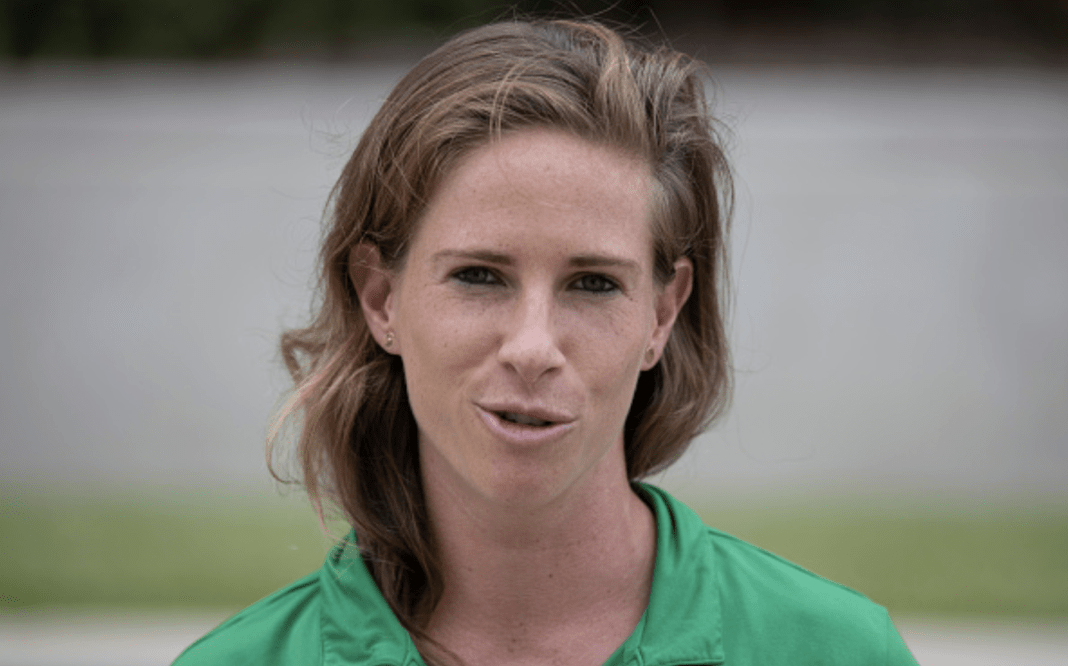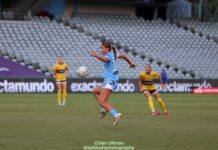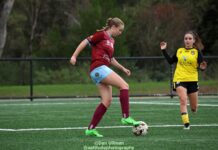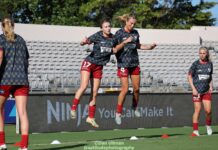
Debuting for Australia in 2007 and with 114 appearances, Elise Kellond-Knight is at the core of the Matildas. She’s played in the three most recent World Cups, the 2016 Rio Olympics, and was an Asian Cup Champion in 2010 and a Tournament of Nations Champion in 2017.
Individually, Kellond-Knight has twice been selected in the World Cup All-Stars Team (2011 and 2015), is a two time 2015 FIFA World Cup Player of the Match, and a two time Australian Player of the Year (2011 and 2015 again).
But 2020 is really testing the resolve of Kellond-Knight, who 10 weeks ago suffered an ACL injury in the first round of the 2020 Damallsvenskan season, playing for Swedish club Kristianstads DFF.
“It’s a grind. I mean no one ever sugarcoats it. It sucks basically,” Kellond-Knight said.
Although the injury happened over 10 weeks ago, Kellond-Knight is only six weeks into her rehab.
“I had to wait four weeks to get surgery,” Kellond-Knight said.
“That wasn’t actually such a bad thing because you can train before surgery so I got back moving quite well after my injury.
“And before the surgery, I was almost able to run. I had some bad bone bruising [initially], which stopped me from being able to run.”
Surgery was just over six weeks ago now. Kellond-Knight is now heavily into the rehab process and is at the point in her recovery that she has some normal daily life function back – she feels human again.
“Those first few weeks really suck because you’re not really able to do much. You can’t move, you’re always in pain. So once you’re able to walk without crutches and get on a bike, you feel like you’re back to normal life, which is where I’m at.”
This isn’t the first-time Kellond-Knight has done her ACL, suffering the same fate 10 years ago when club support wasn’t as efficient as it is now. Back then, Kellond-Knight decided to come home to manage her treatment and recovery. But times are different now and she made the decision to stay at her club in Sweden to manage her rehabilitation, with guidance and support from FFA.
“Now that the female game has become more professional, and there’s better support around it, the decision was to keep me in the club environment,” Kellond-Knight said.
“It’s great for your rehab and being still supported around the team. But it’s very hard mentally and all the other aspects of your life because you’re not near friends or family and you’re quite isolated. Because you’re not necessarily training with the team, you’ve got the team support, but you’re never actually with the team.
“So this rehab process has been a lot harder than 10 years ago, just because of the lack of your usual support services around you.
“Your whole life basically changes, your routines change, and you have to kind of take yourself in a new direction.”
The challenges of being with your team, but not really being with them means for some lonely and difficult times. Even when having fellow Matilda Emily Gielnik close by in Sweden, Kellond-Knight reflects that it’s still complicated.
“I’ve caught up with her a couple of times. It’s been good having another Australian. But of course, she’s heavily involved in her life and we don’t play for the same club, although we live probably only 20 or 30 minutes away from each other.
“The reality is, it’s hard to catch up. So we’ll be able to have dinner occasionally or the occasional coffee, but there’s no real consistency and that’s the hardest part.”
FFA and Club Support
With more Matildas playing further and wider apart than perhaps at any other time, the challenges for FFA to oversee athlete wellbeing and injury management are considerable.
“I got injured probably at a really bad time to be honest – in COVID,” Kellond-Knight said.
“FFA was obviously going through a bit of a process themselves, where staff were stood down and it was just the landscape of getting through COVID where staff were no longer full time around the national team.
“That’s why I heavily relied on the club environment. I’ve always worked closely with David Battersby, our physio. He did my rehab 10 years ago. So I have full faith and trust in him.
“But he’s on the other side of the world and he’s not exactly full time with the national team.
“It’s not his only job so I don’t want to put a burden of having him control everything.”
Kellond-Knight reflects FFA has an overall duty of care and they check in on her progress, but they don’t have “control over everything or over-impose themselves.”
As women’s football becomes more professional, does it open up questions as to whether there are opportunities to improve injury management either at club or national team level?
“Definitely”, was Kellond-Knight’s first response.
Certainly, COVID-19 has had an impact, with Kellond-Knight reflecting that if it wasn’t for the pandemic she would be more inclined to come home and manage treatment, but that the financial barriers were perhaps a deciding factor.
“Probably to be honest, [I’d have gone home] if I didn’t have to pay three grand and do two weeks of quarantine. I probably want to jump on that plane a lot earlier than what I’ve been thinking at the moment.
“You’ve got big differences between the support levels around each club. Even in Sweden, there has been a pandemic of injuries.
“It could be around 15 ACLs, just in the last couple of months.
“There has been a massive amount of serious injuries and investigation needs to go into why that’s occurred and that’ll be probably around the medical standards at each club.
“It just puts a question to whether the standards are good enough here in Sweden, and that would apply to most other countries around the world too.
“The women’s game is growing, but are the surrounding support facilities growing with it? That’s probably the question that COVID has posed,” Kellond-Knight concluded.
Back on the Pitch
After a self-proclaimed “horrendous two years of injuries” Kellond-Knight laments the obstacles along the way, including being misdiagnosed and mistreated with a previous injury.
“Nothing was my fault as the player but I was copping the consequences, basically, and it was just a really hard position to be in.”
Kellond-Knight managed to get back on the pitch, playing a couple of games in January, but then COVID hit and the unpredictable playing environment potentially contributed to another serious injury.
“Most people would have just given up by now, and to be honest, I was close to giving up after my fourth hamstring tear last year.
“I said to myself after I eventually came back into Australia and had been out for five months with the hamstring injury, it just felt like it was never gonna end.
“I said to Dave, our physio, if this tears one more time, like ‘I’ve done this, this is a sign.”
“Because I just can’t take any more.”
Fortunately for Matildas fans, Kellond-Knight was in safe hands and now has her goal set on the Olympics and plans to be back on the pitch by April with a consistent environment to avoid another injury.
Resilience, Balance and Fortitude
Rehabilitation is a balance between the physical recovery and mental fortitude. Ante Milicic was quoted as saying Kellond-Knight would “leave no stone unturned”.
“Yeah, I’m the type of person who wants to do things fast and get back on the pitch as soon as I can. But with this type of injury, that’s not necessarily a good thing,” Kellond-Knight said.
“I’m having to just calm down, take my time, be patient. It’s never a smooth journey. Like you’ll have good days and then suddenly a new pain will pop up and you have to solve what is causing that pain. There are always obstacles that come at you.
“I’d like it to go smoothly, but it never does. This type of injury is a grind.
“But rest assured I’ll be trying to be back on that pitch as soon as I can. And, I mean, my goal is to be back playing in probably late April, May. And we’ll see how that goes. And you never know what happens in the rehab process. But that’s my goal”.
The focus on physical wellbeing for athletes is long known, but the mental wellbeing is paramount to successful recovery and performance.
“It’s super important. We have a psychologist Rob that I’ve been working with consistently,” Kellond-Knight said.
“An injury such as this just takes a massive toll on you as a person, and there’s no way of going around that.
“No matter who you are or what you’re doing, it’s going to be a massive change in your life. So it’s important that you reach out. It’s “R U OK Day” [today] so I think that’s pretty appropriate.
“Even if you do feel okay initially, it’s like a roller coaster so you’ll have probably a period where you think all things are going really good and ‘I’m progressing.’
“Then you might plateau and then you might even dip a little bit and it’s just important that you have a support network around you.”
Surfing and Mindfulness
Kellond-Knight is itching to go surfing. It’s been part of her life from an early age, with her dad as the biggest influence. It’s also something which contributes to the work-life balance professional athletes crave just as much as the rest of us.
“He always tried to get us, my brother and I, into the water when we were young, but we didn’t really like it,” Kellond-Knight reflects.
“When I was 8 or 10 years old and I was like, ‘mmm it’s okay, but I want to play football, like this isn’t really for me.’
“Then it probably wasn’t until I got into my teens and I thought it was a really cool sport like something just clicks and it was like ‘that’s like an adrenaline sport.’ I just got hooked.
“I was just addicted. It just gave me that real sense of enjoyment and adrenaline rush.”
View this post on Instagram
Kellond-Knight craves the freedom and energy she gets from surfing, highlighting the importance it has for her mental health.
“I’d love to be able to go surfing. That’s probably what would help my mental health,” she said.
“To be honest, the one thing that would help me I can’t do which really sucks.”
As the door to surfing is closed for the moment, Kellond-Knight’s character and determination shine through as she looks at filling the void.
“I’ve had to find other things in my life as soon as I got injured.”
“Within a week I was enrolled back at university. I decided to do an MBA.
“I’d been thinking about doing it for the last nine months. Just really thinking about transition and what I wanted to do and where I could see myself after football.
“I’ve procrastinated, it’s just a lot of money, you can’t really get funding. I was hitting closed door after closed door in terms of getting funding because it’s a very expensive master’s program. So I just put it off and thought there will be an opportunity, I’ll just wait for it.”
The injury, which on one hand is so devastating, provided the catalyst to fulfil that goal.
“I’ve started studying which has been really important because it finally gives me that balance and purpose because when you take football away and you’re not training every day, you’re not feeling like you’re achieving.
“You don’t really have that purpose anymore. It can really affect your mental health.
“For me, it was finding that purpose again.
“I’ve taken on probably twice as much work as what I would be if I was just playing football. I’m working with Seven Consulting doing an internship. I’m studying and then just over the last couple of weeks I started to get back on the football field and started to coach some of the youth programs.
“It’s just about finding ways to give yourself purpose and meaning and try and find some sort of enjoyment in life.”
Fulfilment
Kellond-Knight’s profile includes more than being an award-winning footballer. Photography, a corporate internship and surfing are all part of the extraordinary balancing act which actually makes her a better footballer, though what works for Kellond-Knight isn’t for everyone.
“You’ve got some people that will be better footballers if they have a life that feels like it’s fulfilled. Some people just have more mental capacity and they need to be learning, need to be doing other things in their life in order to perform on the pitch.
“I’m that person. I need to be doing something else besides playing football because I am a better player when I have more things on in my life.
“I absolutely love the game and I love football, but if I’m just going to be a footballer, I still don’t feel that fulfilment in my life.
“I had a couple of years where I wasn’t really going in a direction. I was a full-time professional footballer, but I wasn’t necessarily putting other areas of my life into a firm direction.
“I don’t think I’ve really had the best mental stability through that period. It just really affected me and I think it has taken me a long time to realise that it’s just my personality.
“The more that I hear other players speak about it, the more you realise that there are other people like you.”
Kellond-Knight her experience mirrored in a podcast she was listening to. Other players similarly noted being unable to perform when focusing on just football and how it “sucked” the enjoyment out for them.
“I could really relate to that.”
FIFPro, PFA and the Women’s Football Council
It seems as though there would be little time for anything else, but Kellond-Knight also manages to prioritise developing and improving the world game as well with an active role on FFA’s Women’s Football Council and New Leagues Working Group.
Kellond-Knight is also a member of the PFA Executive Committee and FIFPro global players council.
“They’re all volunteer roles and they take a tonne of my time, but they’ve been super rewarding. Because I’m a player that has been a part of the really steep progression of female football, I think I have pretty valuable insights into what has happened over the last 10 years.”
Citing the exponential growth in women’s football in the last five years, Kellond-Knight highlights the excitement for the future.
“It’s about making and ensuring that growth is continued. I just want to make sure the game is in a better state than when I entered it because it was never really a possible dream at that point. And now I think it is a dream and I just want to keep giving it that push up the hill.”
Kellond-Knight’s future looks set to be in football for years to come, both on the field and off. Recounting the lack of female leadership at the highest levels of the game, there’s a firm desire to contribute more and inspire others.
“[I want] to be in that position where I can be one of the leaders to help push the game in the direction that we want.”






